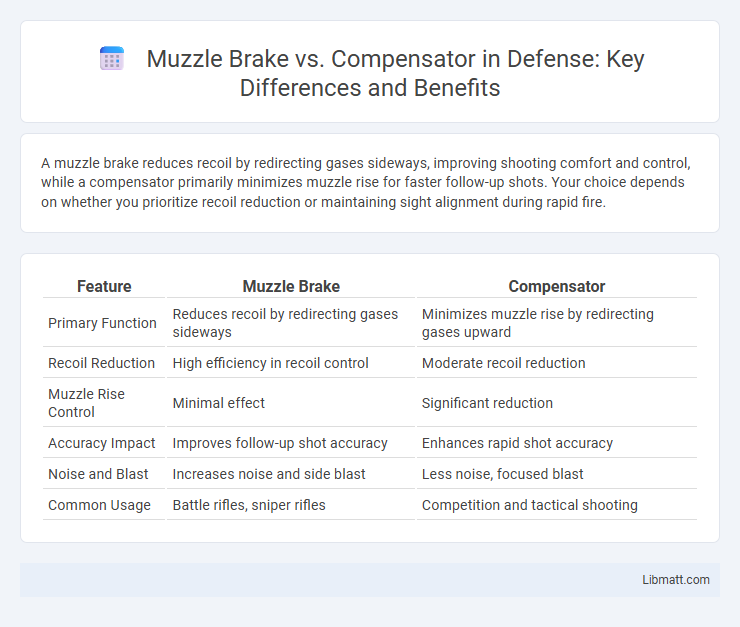A muzzle brake reduces recoil by redirecting gases sideways, improving shooting comfort and control, while a compensator primarily minimizes muzzle rise for faster follow-up shots. Your choice depends on whether you prioritize recoil reduction or maintaining sight alignment during rapid fire.
Table of Comparison
| Feature | Muzzle Brake | Compensator |
|---|---|---|
| Primary Function | Reduces recoil by redirecting gases sideways | Minimizes muzzle rise by redirecting gases upward |
| Recoil Reduction | High efficiency in recoil control | Moderate recoil reduction |
| Muzzle Rise Control | Minimal effect | Significant reduction |
| Accuracy Impact | Improves follow-up shot accuracy | Enhances rapid shot accuracy |
| Noise and Blast | Increases noise and side blast | Less noise, focused blast |
| Common Usage | Battle rifles, sniper rifles | Competition and tactical shooting |
Introduction to Muzzle Brakes and Compensators
Muzzle brakes and compensators are firearm attachments designed to manage recoil and muzzle rise, enhancing shooting accuracy and control. A muzzle brake redirects propellant gases sideways or backward to reduce felt recoil, while a compensator channels gases upward to counteract muzzle climb during rapid fire. Understanding the specific function of each can help you choose the best option to improve your shooting performance.
Defining Muzzle Brakes: Purpose and Mechanism
Muzzle brakes are firearm attachments designed to reduce recoil by redirecting propellant gases sideways and rearward, which lessens the rearward force felt by the shooter. Unlike compensators that primarily counter muzzle rise, muzzle brakes focus on minimizing recoil to improve shot stability and follow-up speed. Understanding the purpose and mechanism of muzzle brakes can help you choose the right device to enhance shooting comfort and accuracy.
Understanding Compensators: Design and Function
Compensators are firearm muzzle devices engineered to reduce vertical recoil by redirecting propellant gases upward, thereby counteracting muzzle rise during shooting. Their design features strategically placed ports or baffles on the top portion of the device to channel gases in a way that stabilizes the firearm's barrel. This function enhances shooter control, allowing for quicker follow-up shots and improved accuracy, especially in rapid-fire scenarios.
Key Differences Between Muzzle Brakes and Compensators
Muzzle brakes redirect propellant gases to reduce recoil by venting gases sideways or backward, significantly minimizing felt kick, while compensators primarily direct gases upward to counteract muzzle rise and improve shot recovery. The key difference lies in their primary function: muzzle brakes focus on recoil reduction, whereas compensators enhance accuracy by controlling muzzle climb. Understanding these distinctions helps you choose the optimal device based on whether recoil management or rapid follow-up shots are your priority.
Recoil Management: Brake vs Compensator
Muzzle brakes excel in recoil management by redirecting gases to reduce backward force, significantly decreasing felt recoil for quicker follow-up shots. Compensators primarily counteract muzzle rise by venting gases upward, helping keep your firearm on target but offering less overall recoil reduction. Choosing between a muzzle brake or compensator depends on whether your priority is minimizing recoil or controlling muzzle climb during rapid fire.
Muzzle Rise and Accuracy: Which Option Wins?
Muzzle brakes effectively reduce recoil by redirecting gases, significantly minimizing muzzle rise and allowing faster follow-up shots, which enhances overall shooting accuracy. Compensators primarily counteract muzzle climb by venting gases upwards, improving shot stability but often with less impact on recoil reduction compared to muzzle brakes. For shooters prioritizing rapid target reacquisition and accuracy in rapid-fire scenarios, muzzle brakes generally provide superior control over muzzle rise.
Noise, Blast, and Shooter Comfort Considerations
Muzzle brakes significantly reduce recoil by redirecting gases sideways, but they tend to increase noise and blast experienced by the shooter and nearby individuals, potentially causing discomfort and requiring hearing protection. Compensators primarily counteract muzzle rise by channeling gases upward, resulting in less lateral blast and noise compared to muzzle brakes, enhancing shooter comfort during rapid-fire sequences. Choosing between the two involves balancing recoil management with noise and blast impact, where compensators offer quieter operation and muzzle brakes provide stronger recoil reduction.
Application Scenarios: Choosing the Right Device
Muzzle brakes excel in high-recoil firearms like large-caliber rifles, effectively reducing felt recoil for improved shooter comfort and faster follow-up shots in hunting and long-range shooting. Compensators are ideal for competition shooting and rapid-fire scenarios, as they counteract muzzle rise by redirecting gases upward to maintain target alignment. Selecting between a muzzle brake and compensator depends on balancing recoil reduction needs with controlling muzzle climb based on the primary shooting activity.
Installation and Compatibility Factors
Muzzle brakes and compensators differ in installation due to their thread sizes and barrel compatibility, with muzzle brakes often requiring robust threading to handle increased gas redirection pressures. Compatibility hinges on matching the device's caliber-specific design with the firearm's barrel diameter and threading pattern, ensuring proper fit and optimal performance. Proper torque settings and alignment during installation are critical to prevent damage and maintain accuracy.
Conclusion: Muzzle Brake vs Compensator – Which Is Better?
Muzzle brakes excel at reducing recoil by redirecting gases sideways, making them ideal for shooters aiming to maintain accuracy during rapid fire. Compensators primarily counteract muzzle rise by venting gases upwards, improving follow-up shot speed and control in precision shooting. Choosing between a muzzle brake and compensator depends on the specific shooting goal, with muzzle brakes preferred for recoil mitigation and compensators favored for managing muzzle climb.
muzzle brake vs compensator Infographic

 libmatt.com
libmatt.com